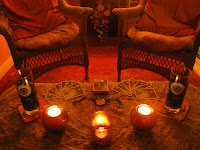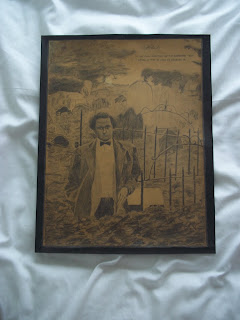
The weather is bitter and grey
And I can see my breath today
As I pass transitional places,
Glimpsing strangers’ pale, pinched faces,
Passed by students in loud bunches,
Hurrying for fast-food lunches
Past the college and hospital,
Where the trees shiver and leaves fall.
Now, as a church chimes the cold hour,
I imagine time as that tower:
The remembered apartment-block,
Its bricks like minutes on a clock.
The hospital’s grey height rises
On one side, this white cliff rises
On the other, where bare black trees
Clutch at it like fingers that freeze.
Does she still stand, I wonder now,
At her easel by the window
High in that white cliff of concrete,
Where, now and again, we would meet.
It was a fraction of our lives
That passed between husbands and wives;
Poems read, songs sang once or twice;
Hearts betrayed, broken in a trice.
Her voice now is but a whisper,
As faint as that of her sister.
Those were times that didn’t last long,
Back when our lives had all gone wrong.
* * * *
Summer now and I walk the route
Again, knowing every long root
Of the tree of this old hometown;
Heading upwards to look back down
From where I sit beneath a tree,
Counting blessings, lucky old me
In the cemetery on the hill,
Gazing at buildings standing still
In time on this bright, dappled day,
Past the prison and the railway,
The memorial in the park
And that bone-white apartment block.
Past graves of infants and ancients,
I praise the virtues of patience
And fortitude and hope whereof
I give my thanks for joy and love.
Clanking the gate shut behind me,
I get my bearings and then see
Students in mortar-boards and cloaks
With proud, dressed in Sunday-best folks.
Processing from graduation,
Some of them, in this transition,
May be lost, some found, all will grow
Beyond a point none yet can know.
Two decades span a century:
Twenty years since I was set free
From one life into another;
Though the bridge still spans the river.
A life lived fully in one town
Means the past will follow you down
And round the corners of your days:
You move on, but everything stays.
(2010)
A couple of winters ago I was having a course of treatment at the Leicester Royal Infirmary and each week would pass the white tower-block where I used to meet someone with whom I had a brief relationship back in the late ‘80s (followed by another brief relationship with one of her sisters. Not a very neat situation).
Anyway, one of my many meditations on the meaning and the passing of time ensued and most of the first half of this poem stumbled into being before falling down unfinished.
Then, last summer I went for a walk around that area of Leicester, past the Victorian sites that have thankfully survived the ravages of the town’s philistine developers and ended up in the Welford Road Cemetery (incidentally, you can’t literally End Up there anymore because it’s been shut for business for some years now). I saw the graduates and suddenly the poem was all but finished.
That striking white tower-block opposite the Infirmary has weathered remarkably well, by the way, and is one of the very few buildings of the last few decades that I actually like in the city.





















